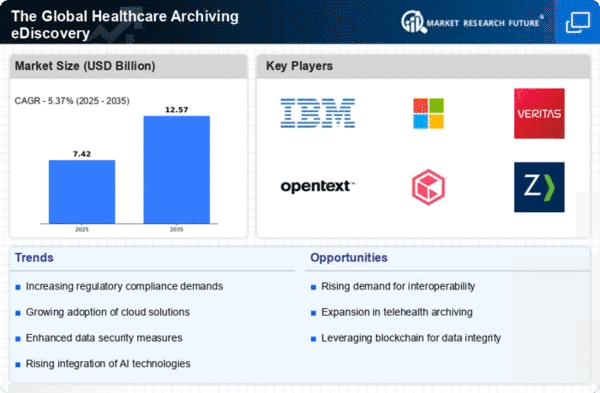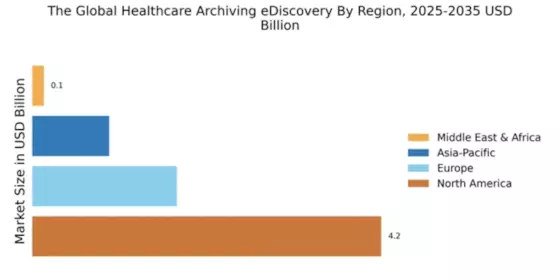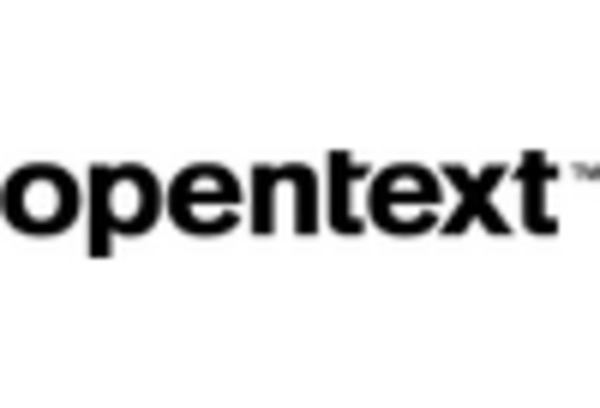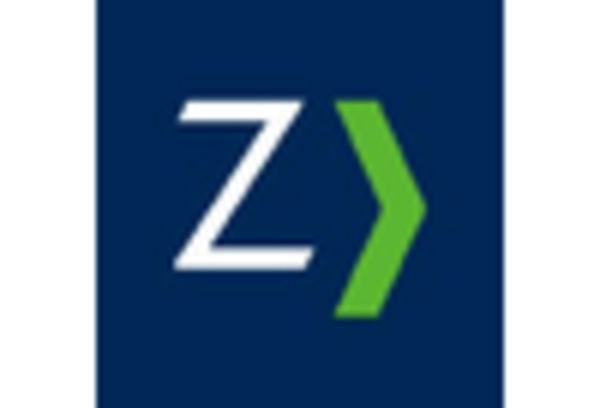Rising Data Volume
The exponential growth of healthcare data is a primary driver of the Global Healthcare Archiving and eDiscovery Market Industry. With the advent of electronic health records, telemedicine, and wearable health technology, the volume of data generated is staggering. It is estimated that healthcare data will continue to expand, necessitating efficient archiving solutions to manage this influx. Organizations are increasingly seeking scalable archiving systems that can accommodate large datasets while ensuring quick retrieval for eDiscovery purposes. This trend is likely to contribute to the market's growth, with projections indicating a rise to 17.6 USD Billion by 2035.
Market Growth Projections
The Global Healthcare Archiving and eDiscovery Market Industry is poised for substantial growth, with projections indicating a rise from 6.44 USD Billion in 2024 to 17.6 USD Billion by 2035. This growth trajectory suggests a compound annual growth rate of 9.56% from 2025 to 2035. Such figures underscore the increasing importance of effective data management solutions in the healthcare sector, driven by regulatory compliance, rising data volumes, and technological advancements. The market's expansion reflects the critical role that archiving and eDiscovery solutions play in ensuring operational efficiency and data security within healthcare organizations.
Technological Advancements
Innovations in technology play a crucial role in shaping the Global Healthcare Archiving and eDiscovery Market Industry. The integration of artificial intelligence and machine learning into archiving solutions enhances data management capabilities, allowing for more efficient sorting, retrieval, and analysis of healthcare records. These advancements not only streamline eDiscovery processes but also improve overall operational efficiency within healthcare organizations. As technology continues to evolve, the market is expected to experience significant growth, with a projected compound annual growth rate of 9.56% from 2025 to 2035, indicating a robust demand for advanced archiving solutions.
Growing Focus on Data Security
Data security concerns are increasingly influencing the Global Healthcare Archiving and eDiscovery Market Industry. With the rise in cyber threats and data breaches, healthcare organizations are prioritizing the protection of sensitive patient information. This focus on security drives the demand for archiving solutions that incorporate advanced encryption, access controls, and audit trails. Organizations are investing in technologies that not only ensure compliance but also safeguard against unauthorized access and data loss. As a result, the market is expected to expand significantly, reflecting the critical need for secure data management practices in healthcare.
Increasing Regulatory Compliance
The Global Healthcare Archiving and eDiscovery Market Industry is driven by the rising need for compliance with stringent regulatory frameworks. Healthcare organizations are mandated to retain patient records and other critical data for extended periods, often up to 10 years or more, depending on jurisdiction. This compliance is essential to avoid legal repercussions and financial penalties. As regulations evolve, the demand for robust archiving solutions that ensure data integrity and accessibility grows. In 2024, the market is projected to reach 6.44 USD Billion, reflecting the increasing investment in compliance-related technologies and services.
Shift Towards Digital Transformation
The ongoing shift towards digital transformation within the healthcare sector is a significant driver of the Global Healthcare Archiving and eDiscovery Market Industry. As healthcare providers increasingly adopt digital solutions, the need for effective archiving and eDiscovery mechanisms becomes paramount. Digital transformation initiatives often involve the migration of legacy systems to cloud-based platforms, necessitating robust archiving solutions to manage historical data. This transition is likely to propel market growth, as organizations seek to enhance their operational efficiency and improve patient care through streamlined data management practices.


















